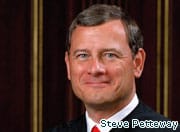US Supreme Court judges have branded their colleagues’ ruling which imposed same-sex marriage on every state in America as self-conceited and arrogant.
On Friday court papers showed that while five judges backed the decision, four dissented: Chief Justice John Roberts, Antonin Scalia, Clarence Thomas and Samuel Alito.
The scathing criticisms ranged from the Court having no mandate to redefine marriage to highlighting that it would marginalise any who do not accept the “new orthodoxy”.
Demands
Antonin Scalia said he was astounded by the “hubris” reflected in the judgment which found a right for same-sex marriage in the US Constitution, more than 200 years after its inception.
Alito warned that the ruling could lead to people who do not support same-sex marriage being treated as “bigots” by governments, schools and employers.

Thomas was alarmed at the possible impact on religious liberty, warning that conflict could arise when people are “confronted with demands to participate in and endorse civil marriages between same-sex couples”.
And Roberts questioned whether the Court’s decision opened the way for state-backed unions of more than two people. “Just who do we think we are?”, he said.
New orthodoxy
In his dissenting opinion, Samuel Alito said that the ruling “will be used to vilify Americans who are unwilling to assent to the new orthodoxy”.
While there was some attempt to reassure people who do not support same-sex marriage in the ruling from the five majority judges, he questioned whether conscience rights would be protected.
“I assume that those who cling to old beliefs will be able to whisper their thoughts in the recesses of their homes, but if they repeat those views in public, they will risk being labeled as bigots and treated as such by governments, employers, and schools”, the judge said.
He added: “By imposing its own views on the entire country, the majority facilitates the marginalization of the many Americans who have traditional ideas.”
Freedom
Thomas pointed out that religious liberty is about more than religious groups teaching about faith – it is about “freedom of action in matters of religion generally”.
Scalia, who was appointed to the Court in 1986, said the decision went against years of legal opinion.
He said the five judges have “discovered in the Fourteenth Amendment a ‘fundamental right’ overlooked by every person alive at the time of ratification, and almost everyone else in the time since”.
Big leap
Roberts, the Chief Justice, noted that recognised plural unions could follow the same-sex marriage decision.
He wrote that the decision “offers no reason at all why the two-person element of the core definition of marriage may be preserved while the man-woman element may not”.
“Indeed, from the standpoint of history and tradition, a leap from opposite-sex marriage to same-sex marriage is much greater than one from a two-person union to plural unions”, he added.
“If the majority is willing to take the big leap, it is hard to see how it can say no to the shorter one”, Roberts said.
Defend religious liberty
Criticism of the ruling also came from leading Republican figures, but President Barack Obama welcomed the move.
Many states began issuing marriage licences to same-sex couples soon after the ruling was released, but Texas’ Attorney General has said he backed the right of individual civil servants to follow their consciences on the matter.
Ken Paxton said: “I will do everything I can from this office to be a public voice for those standing in defense of their rights”.

